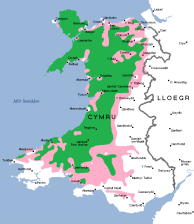Welsh language
Welsh (Cymraeg [kəmˈraːiɡ] ⓘ or y Gymraeg [ə ɡəmˈraːiɡ]) is a Celtic language of the Brittonic subgroup that is native to the Welsh people. Welsh is spoken natively in Wales, by some in England, and in Y Wladfa (the Welsh colony in Chubut Province, Argentina).[7]
Welsh
$_$_$DEEZ_NUTS#0__titleDEEZ_NUTS$_$_$
$_$_$DEEZ_NUTS#0__subtitleDEEZ_NUTS$_$_$
$_$_$DEEZ_NUTS#0__call_to_action.textDEEZ_NUTS$_$_$
It is spoken by smaller numbers of people in Canada and the United States descended from Welsh immigrants, within their households (especially in Nova Scotia). Historically, it has also been known in English as "British",[8] "Cambrian",[9] "Cambric"[10] and "Cymric".[11]
The Welsh Language (Wales) Measure 2011 gave the Welsh language official status in Wales.[12] Welsh and English are de jure official languages of the Welsh Parliament, the Senedd,[13] with Welsh being the only de jure official language in any part of the United Kingdom, with English being de facto official.
According to the 2021 census, the Welsh-speaking population of Wales aged three or older was 538,300 (17.8%) and nearly three quarters of the population in Wales said they had no Welsh language skills.[14] Other estimates suggest that 896,300 people (29.2%) aged three or older in Wales could speak Welsh in December 2023.[15] Almost half of all Welsh speakers consider themselves fluent, while 20 per cent are able to speak a fair amount.[16] 56 per cent of Welsh speakers speak the language daily, and 19 per cent speak the language weekly.[16]
The Welsh government plans to increase the number of Welsh-language speakers to one million by 2050. Since 1980, the number of children attending Welsh-medium schools has increased, while the number going to Welsh bilingual and dual-medium schools has decreased.[17] Welsh is considered the least endangered Celtic language by UNESCO.[18]
$_$_$DEEZ_NUTS#8__descriptionDEEZ_NUTS$_$_$
$_$_$DEEZ_NUTS#2__titleDEEZ_NUTS$_$_$
$_$_$DEEZ_NUTS#2__descriptionDEEZ_NUTS$_$_$
$_$_$DEEZ_NUTS#4__descriptionDEEZ_NUTS$_$_$
$_$_$DEEZ_NUTS#4__heading--0DEEZ_NUTS$_$_$
$_$_$DEEZ_NUTS#4__description--0DEEZ_NUTS$_$_$
$_$_$DEEZ_NUTS#4__heading--1DEEZ_NUTS$_$_$
$_$_$DEEZ_NUTS#4__description--1DEEZ_NUTS$_$_$
$_$_$DEEZ_NUTS#4__heading--2DEEZ_NUTS$_$_$
$_$_$DEEZ_NUTS#4__description--2DEEZ_NUTS$_$_$
$_$_$DEEZ_NUTS#4__heading--3DEEZ_NUTS$_$_$
$_$_$DEEZ_NUTS#4__description--3DEEZ_NUTS$_$_$
$_$_$DEEZ_NUTS#3__titleDEEZ_NUTS$_$_$
$_$_$DEEZ_NUTS#3__descriptionDEEZ_NUTS$_$_$
$_$_$DEEZ_NUTS#3__heading--0DEEZ_NUTS$_$_$
$_$_$DEEZ_NUTS#3__description--0DEEZ_NUTS$_$_$
Vocabulary[edit]
Welsh supplements its core Brittonic vocabulary (words such as wy "egg", carreg "stone") with hundreds of word lemmas borrowed from Latin,[119] such as (ffenestr 'window' < Latin fenestra, gwin 'wine' < Latin vinum). It also borrows words from English, such as (silff 'shelf', giât 'gate').
$_$_$DEEZ_NUTS#6__titleDEEZ_NUTS$_$_$
$_$_$DEEZ_NUTS#6__subtextDEEZ_NUTS$_$_$
$_$_$DEEZ_NUTS#5__titleDEEZ_NUTS$_$_$
$_$_$DEEZ_NUTS#5__subtextDEEZ_NUTS$_$_$
$_$_$DEEZ_NUTS#7__titleDEEZ_NUTS$_$_$
$_$_$DEEZ_NUTS#7__subtextDEEZ_NUTS$_$_$
$_$_$DEEZ_NUTS#1__titleDEEZ_NUTS$_$_$
$_$_$DEEZ_NUTS#1__subtextDEEZ_NUTS$_$_$
$_$_$DEEZ_NUTS#1__answer--0DEEZ_NUTS$_$_$
$_$_$DEEZ_NUTS#1__answer--1DEEZ_NUTS$_$_$
$_$_$DEEZ_NUTS#1__answer--2DEEZ_NUTS$_$_$
$_$_$DEEZ_NUTS#1__answer--3DEEZ_NUTS$_$_$
$_$_$DEEZ_NUTS#1__answer--4DEEZ_NUTS$_$_$
$_$_$DEEZ_NUTS#1__answer--5DEEZ_NUTS$_$_$
$_$_$DEEZ_NUTS#1__answer--6DEEZ_NUTS$_$_$
$_$_$DEEZ_NUTS#1__answer--7DEEZ_NUTS$_$_$
$_$_$DEEZ_NUTS#1__answer--8DEEZ_NUTS$_$_$
$_$_$DEEZ_NUTS#1__answer--9DEEZ_NUTS$_$_$
$_$_$DEEZ_NUTS#1__answer--10DEEZ_NUTS$_$_$



